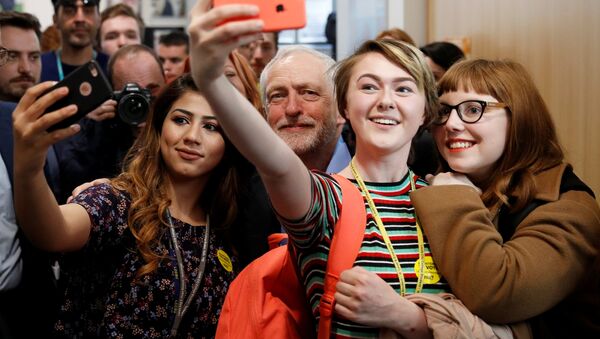A record number of young people voted in the general election, according to social media figures, however the exact number is still yet to be confirmed.
So just how big was the youth vote and what impact did it have on the overall result?
Approximate Twitter numbers claim that at least 72 percent of 18-24 year olds went to the polls, however as of yet, no sources for that figure have been offered.
So the question has been raised as to how much influence and power young people have in the voting stratosphere?
Good to see a healthy queue of students waiting to vote at the @uniofeastanglia polling station #GE2017 pic.twitter.com/yn81DK2GxS
— Kirsty Webb (@Kirsty_Worm) June 8, 2017
When the 2017 figures are compared to the previous 2015 general election, it's clear that young people have become more politically astute. According to Office for National Statistics (ONS), only 43 percent of the youth voted in 2015 and 64 percent turned up at the Brexit ballot. Many experts believe that young people are starting to take a more active role in the election simply because they are concerned about their future.
It irks me when these people on TV say the "youth vote". How about just "the vote"? We're part of the electorate. We're adults. #GE2017
— Hannah Witton (@hannahwitton) June 9, 2017
Are the tories seriously blaming youth vote for labour gains like we shouldn't count? THIS IS WHY WE DON'T VOTE FOR YOU. #hungparliament
— Bean (@Pbeanthatsme) June 9, 2017
Good point made by a friend — don't think there's been a single person under 40 interviewed on ANY channel. But the youth vote swung it.
— Caitlin Moran (@caitlinmoran) June 9, 2017
#BBCelection Tory on BBC blames youth vote for loss. Literally saying they would have gotten away with it if it weren't for those pesky kids
— Sarah Montrose (@sarahmontrose) June 9, 2017
Historically, young people have always failed to show up when it came to voting. According to an online poll, conducted by YouGov, an international survey and research organization, age plays a huge part in which political party a UK citizen decides to support. Analysis has suggested that the current age of those who are more likely to start voting is 34.
Thank you to the young people in the UK 🇬🇧 for showing up and voting. You are the force needed for real change #GeneralElection https://t.co/i2QIe5ldPw
— David Blain (@beachmagoo) 10 June 2017
Early in the election campaign there were several encouraging signs that young people were taking a real interest in voting. 1.05 million 18 to 24 year olds registered to vote, and over a quarter of a million under 25s registered to vote on the last day of registration. This was the largest demographic and was followed by the 25 to 34 year olds.
It was also noted that a large number of young people voted for the Labour Leader Jeremy Corbyn, and election experts said that this played a crucial role in denying Prime Minister Theresa May, her majority.
A survey of 14,000 people, conducted by Lord Ashcroft, a former Conservative donor, found that two-thirds of 18 to 24 year olds cast their ballot for Corbyn. Meanwhile, more than half of those were aged 25 to 34 opted for Labour.
Many of the reasons why young people voted for Corbyn was that his campaign spoke to their age group. Corbyn positioned himself as the young person's candidate according to experts. He campaigned for the abolition of tuition fees and he had heavy endorsement from grime artists such as JME and Stormzy.
Andy Coulson, the former director of communications for David Cameron said that the youth came out and made sure their voices heard.
"The youth vote has come out in strength and lashed out pretty aggressively", Coulson said in a recent interview.


